The Guild website is down at the moment - we're working on getting it back up as soon as possible.
01/09/06 Update: All fixed and working fine.
Thursday, August 31, 2006
Google offers free book downloads
Google...[is] letting consumers download and print free of charge classic novels and many other, more obscure books that are in the public domain.More from Business Week.
Using Google's Book Search service, Web surfers hunting titles like Dante's "Inferno" and Aesop's "Fables" will be able to download PDF files of the books for later reading, to run keyword searches or to print them on paper. Up to now, the service only allowed people to read the out-of-copyright books online.
Has anyone tried this yet?
Emmy wins for Brits
British shows won a clutch of awards at the Emmy's earlier this week. The Girl In The Café, written and directed by Guild member Richard Curtis, won three awards including for best made-for-TV movie, while Elizabeth I won nine. Helen Mirren, who won an Emmy for her role as the Virgin Queen, praised the writers behind the winning shows, as The Guardian reported. 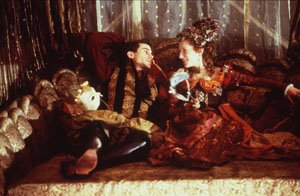 Elizabeth I, written by...?
Elizabeth I, written by...?
Unfortunately, as a letter to The Guardian from Leslie Megahey pointed out, there was one thing they forgot.
"Without the writing we can't do it, especially us women," said Mirren as she collected her award at the ceremony in Los Angeles on Sunday night.
"Every one of these great performances by these great actresses in this category were revealed to us by some wonderful writing.
"Women are 50% of the world's population, maybe more. And I know there are many more brilliant performances by women of all ages and all races waiting to be revealed by some great writing, so let's look forward to that."
 Elizabeth I, written by...?
Elizabeth I, written by...?Unfortunately, as a letter to The Guardian from Leslie Megahey pointed out, there was one thing they forgot.
Your report on the nine Emmies awarded to the Channel 4 drama Elizabeth I (August 29) is headlined "Great writing is key to success, says Mirren". You go on to quote accolades from Mirren and her co-star Jeremy Irons - "great writing", "wonderful writing" and "without the writing we can't do it". It is a shame you didn't actually manage to mention the screenwriter's name - it is Nigel Williams.
Joseph Stefano obituary
Screenwriter Joseph Stefano, who wrote the script for film classic Psycho, has died at the age of 84.More from BBC News.
Stefano began his career as a pianist, singer and dancer but only found real success with his writing - first songs and then screenplays.
He was best known for adapting Robert Bloch's novel Psycho - which director Alfred Hitchcock asked him to rework for the big screen.
Monday, August 28, 2006
Chasing the story
In The LA Times, Marvin J. Wolf explains how tough it is to get exclusive rights to a true story.
Remember the story? An Ashland, Ore., family—dad, mom, two kids, his mom and her new husband—go missing on a day trip in a motor home. All-points bulletins, search parties, helicopters, bloodhounds, prayer vigils.
Nada. The search is called off. Hope fades.
Then, 17 days after wrong turns got them lost and snowbound in Oregon's coastal mountains, dad and mom come hiking through the snow, tired but healthy. Miracle in the mountains!
My writing partner stumbles on this story before the national media get it. We see a multigenerational family movie: a marriage fraying around the edges; alienated kids; a grumpy, fault-finding older couple. Two weeks off the map, coping with the elements. Food dwindling, water a problem. Maybe a hint of danger. Then grumpiness emerges as wisdom. Kids blossom under adult attention. Forced to work as a team, the family comes together, one for all and all for one.
In other words, pure movie gold.
Every producer we pitch is interested—if we can get exclusive rights.
John Connolly interview
John Connolly has taken a break from his popular Charlie Parker series of crime novels and ventured into weird new territory with 'The Book of Lost Things'. Tim Martin meets him in Waterford to discuss his change of direction.More in The Independent.
"Like most first-time writers I never thought that I was going to be published," he says. "It still takes me by surprise to see myself in print, or to see myself still in print." He started out as a journalist - "I didn't write fiction, it was probably my father's realism that said that most people are not going to make a living by writing books" - but discovered over five years that he wasn't cut out for it. "I got frustrated," he says. "I sat down and wrote what became the prologue of Every Dead Thing - I spent about six months writing that prologue and thinking, I'll just go over it one more time, dot all my Is, cross my Ts, and then four-and-a-half years later I had a book. I never thought that anybody would want it. I was just so relieved when somebody did because I really couldn't take being a journalist any more."
Alan Ayckbourn interview
Alan Ayckbourn, still recovering from a stroke, speaks to Alan Strachan The Daily Telegraph.
Traditionally, Ayckbourn never begins a new play until the most recent one has been staged, although, he adds, "I've made a little mental note to myself to write for Christmas 2007 -something wild, a bit potty", so the old fermenting process has evidently begun.
In the meantime, his schedule is awesome. Early next month he will start rehearsals for If I Were You. "I've given myself five weeks rather than the usual four, just to pace myself. And the doctor warned me that you can get unaccountably tired."
Friday, August 25, 2006
Shoot The Messenger
Sharon Foster won the Dennis Potter Award for screenwriting and her first major film has produced a furore true to the spirit of the chain-smoking doyen of TV writers, as BBC News reports.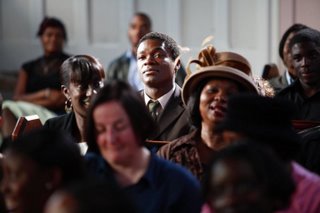 David Oyelowo in Shoot The Messenger (Photo: Mike Hogan/BBC)
David Oyelowo in Shoot The Messenger (Photo: Mike Hogan/BBC)
The film will be shown on 30 August on BBC Two.
The film...opens with the line: "Whenever I think about it, everything bad that has ever happened to me has involved a black person."
Director Ngozi Onwurah told the BBC News website that the film deals with issues prevelant in the black community, "but quite often don't talk about in public".
"Part of the role of a writer is having to look at some of the more uncomfortable things in the world that you know," she said.
 David Oyelowo in Shoot The Messenger (Photo: Mike Hogan/BBC)
David Oyelowo in Shoot The Messenger (Photo: Mike Hogan/BBC) The film will be shown on 30 August on BBC Two.
"This is one of the most racist, demeaning and misrepresentative films ever broadcast and commissioned by the BBC," said Toyin Agbetu, the founder of Ligali, which seeks to challenge "the misrepresentation of African people in the British media".
"African people in Britain are portrayed as a monolithic, belligerent, aggressive, politically naive and intellectually-diminished," he added.
ITV wants to cut children's shows
ITV has sent a written request to broadcasting watchdog Ofcom asking permission to reduce the amount of children's programmes it shows on ITV1.More from BBC News.
About eight hours of children's programmes are currently screened on the channel each week.
The ITV network announced it would stop making shows for youngsters two months ago, while children's controller Estelle Hughes resigned last week.
Ofcom said a decision on ITV's request would be made in the autumn.
Severance - James Moran
British screenwriter James Moran has his first film, Severance, opening today. He's been blogging since 2003, although at time of writing his last post was on Wednesday before the charity premiere. 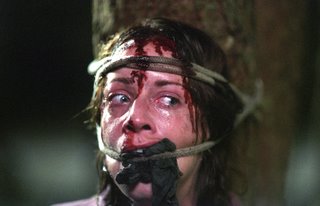 Speechless: Claudie Blakey in Severance (Photo: Nick Wall)
Speechless: Claudie Blakey in Severance (Photo: Nick Wall)
I'm trying not to think about it, trying to concentrate on other things, but it's impossible. I am so excited, I can barely articulate myself, and have been forgetting how to speak all day.
 Speechless: Claudie Blakey in Severance (Photo: Nick Wall)
Speechless: Claudie Blakey in Severance (Photo: Nick Wall)
Thursday, August 24, 2006
TV laughs go belly up
The sitcom in crisis (part 97) by John Plunkett on The Guardian's Organ Grinder blog.
The danger is that if audiences continue to decline then comedy - already a risky business - will be seen by broadcasters as simply not worth the gamble. Performers like Ricky Gervais, who have already taken their radio show to the web, will take their TV shows there as well.
Could YouTube become the new equivalent of the old BBC2/Channel 4 Friday night comedy zone?
Edinburgh Writing Awards 2006 - winners
The Winners of the 2006 Edinburgh Writing Awards run by the Writers' Guild and The List have been announced. Chosen from a shortlist selected from a total of 392 eligible performances, the judging panel has chosen the following winners:
The judging panel consisted of:
Awards ceremony photos
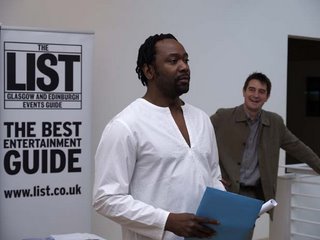 Reginald D Hunter: Best Comedy Writing
Reginald D Hunter: Best Comedy Writing
 Simon Brodkin: Best Comedy Newcomer
Simon Brodkin: Best Comedy Newcomer
 Black Watch director John Tiffany accepts the award for Best Theatre Writing on behalf of Gregory Burke.
Black Watch director John Tiffany accepts the award for Best Theatre Writing on behalf of Gregory Burke.
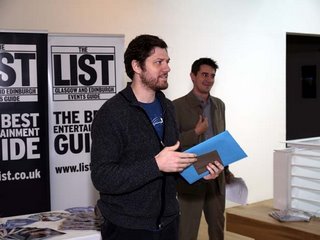 Adam Rapp: Best Theatre Newcomer
Adam Rapp: Best Theatre Newcomer
Photos by Luke Watson.
- Best Comedy Writing (Prize: £500): Reginald D Hunter
- Best Comedy Newcomer (Prize: £250 plus BBC mentoring scheme): Simon Brodkin
- Best Theatre Writing (Prize: £500): Gregory Burke for Black Watch
- Best Theatre Newcomer (Prize: £250 plus BBC mentoring scheme): Adam Rapp for Finer Noble Gases
The judging panel consisted of:
- Arthur Smith, comedian (Chair)
- Sally Avens, BBC Drama Producer
- Nick Barley, Editor, The List
- Steve Cramer, Theatre Editor of The List
- Brian Donaldson, Comedy Editor of The List
- Pete Sinclair, comedy writer
Awards ceremony photos
 Reginald D Hunter: Best Comedy Writing
Reginald D Hunter: Best Comedy Writing Simon Brodkin: Best Comedy Newcomer
Simon Brodkin: Best Comedy Newcomer Black Watch director John Tiffany accepts the award for Best Theatre Writing on behalf of Gregory Burke.
Black Watch director John Tiffany accepts the award for Best Theatre Writing on behalf of Gregory Burke. Adam Rapp: Best Theatre Newcomer
Adam Rapp: Best Theatre NewcomerPhotos by Luke Watson.
Wednesday, August 23, 2006
BBC Radio Scotland comedy pulled
The BBC has pulled a radio comedy show featuring sketches of a cow flying into the twin towers and a spoof Rolf Harris drawing cartoons of the prophet Muhammad.More from in Media Guardian (free registration required).
BBC Radio Scotland's The Franz Kafka Big Band was due to begin next week but has been removed from the schedules after concerns about its controversial content.
The corporation said the programme's "bold" subject matter required some "fine-tuning" before it could go on air.
Prison Break - series two
Can hit TV series Prison Break succeed for a second series, asks Edward Wyatt in The New York Times?
Paul T. Scheuring, the series creator and head writer, is confident, for one main reason. “A lot of people,” he said, “are going to be killed.”
“The ramifications of this escape are going to be very obvious, in that we’re not going to try to sustain the show or kind of cheapen it in any way by trying to stretch too much out of the season,” he said.
“Those eight guys who start on the ground running in Season 2,” he added, “virtually none of those will be there in their current iterations, involved in the Season 3 story line.”
Tuesday, August 22, 2006
Games industry "is failing women"
The videogames industry is continuing to fail women by not producing suitable content, a senior executive at Electronic Arts (EA) has said.More from Darren Waters on BBC News. He's also keeping a log from the Edinburgh Interactive Entertainment Festival, where Gardner's speech was made.
David Gardner, chief operating officer for EA's worldwide studios, was speaking to a conference in Edinburgh.
He said: "We have all been talking about this for a long, long time."
John Heffernan interview
Dylan Callaghan interviews John Heffernan for the Writers Guild of America, west.
Though Snakes on a Plane [Screenplay by John Heffernan and Sebastian Gutierrez, Story by David Dalessandro and John Heffernan] is his first script to reach the big screen, John Heffernan has pretty high expectations. “If someone were to say, 'Here's 60 million dollars,' I'd make a Western,” he says. Yet Heffernan, who graduated from Cornell University with a degree in English literature, is as much a student of Goddard and Bertolucci as he is of Ford and Peckinpah. Starring Samuel Jackson and a mess of slithering reptiles, Snakes on a Plane is an exuberant reflection of his multi-genre affection for cinema.
Tom and Jerry smoking ban
Tom and Jerry can chase each other as much as they like, wielding hammers and axes, but what they must not do, in the eyes of the media watchdog Ofcom, is light up a cigarette. Some 65 years after the quick-tempered cat and opportunistic mouse made their debut in The Midnight Snack, smoking scenes from the series have been cut.More from Hugh Davies in The Daily Telegraph.
"Buzz" Bezzerides
A new documentary about screenwriter AI "Buzz" Bezzerides will premiere in America this week, reports Susan King for The LA Times.
Though Bezzerides worked with such directors as Nicholas Ray and Jules Dassin, [documentray maker
Filmmaker Spiro] Taraviras says, "he was always in the shadow of the studio. He was an employee of the studio and many times was not given a credit. I think he was not a good businessman. He was believing in the good of the people. But he didn't realize you have to take care of yourself."
Monday, August 21, 2006
Andy Harries on ITV
In Media Guardian (free registration required) Maggie Brown talks to Andy Harries, the ITV controller of drama, comedy and films.
"Don't you think that the ABs [upmarket viewers] have stopped watching ITV because it has become unwatchable? Hundreds of people tell me this. There is too much clutter, and it is putting people off. ITV is so unfashionable. It doesn't have to be like Channel 4, but it should be modern. It looks like a bargain basement."
Throw in the towel
Brace yourselves. On WordPlay, Terry Rossio lists the reasons why aspiring screenwriters why they should just give up. Thanks to The Artful Writer for the link.
I'll always remember a line from Larry Bird's biography. It was right at the beginning, at a description of how Larry came to start playing basketball. Apparently he went out to a court, and just started shooting around with a bunch of friends. The descriptive line then said, "He noticed that his shot always went in."
That's such a powerful line to me, because it indicates the pre-existence of his ability. He didn't practice for years -- not until later, anyway. At first, he just 'noticed' that he had this amazing ability.
It's that magical thing called talent. It's something that you notice you have. You can't invent it, it's got to be there. And if you don't notice it, if people aren't telling you that you have it, you have to consider the probability that it doesn't exist.
And without talent, you'll never make it in this business.
Friday, August 18, 2006
U-571 writer regrets "distortion"
Screenwriter David Ayer has admitted his 2000 film U-571 distorted history and that he would not do it again.More from BBC News.
Ayer told BBC Radio 4's The Film Programme that he "did not feel good" about suggesting Americans captured the Enigma code rather than the British.
"It was a distortion... a mercenary decision to create this parallel history in order to drive the movie for an American audience," he said.
Respectable
Five's new sitcom [Respectable] is about prostitution. You know the funniest part? The women all love their workIn The Guardian, Kira Cochrane is not amused.
Four female characters, all prostitutes, and all - naturally, this being a comedy - happy hookers, hoofing it up and uttering deathless quips about blowjobs.
Animation writers' royalties
In The LA Times, Jay A. Fernandez looks at why Hollywood animation writers are trying to get the same deals as their live-action counterparts.
Writers of live-action features get royalties when their work is repackaged and sold. But writers of animation don't. Their "ancillary profit participation," as it's known, is paid in multiples of zero.
It's an industry standard evolved over a decades-long debate between the writers and their employers, and in a practical sense, it means that the writers of "Goldmember" get paid a small percentage of every sale of a video or DVD, which can add up to tens or even hundreds of thousands of dollars, while the writers of "Shrek 2" receive nothing.
This disparity has its roots in the early days of animation, when storyboard artists and animators were the primary creative forces behind projects and screenwriters, if they were used at all, came in to add polish at the end.
Theatre blogs
UK theatre isn't blogged as extensively as film or books but, thanks to Mark Shenton, I've discovered two good ones this week: My London Life, by director Paul Miller and Encore Theatre Magazine, by a whole collection of (anonymous) people.
Thursday, August 17, 2006
BBC Sketch Factor
Have you ever listened to a comedy show on the radio and thought; 'I could do that?' Well now you can.The closing date for entries is 11 October. Full details are on the the BBC New Talent website.
Sketch Factor is a unique opportunity to join the writing team of a brand new sketch show for BBC Radio 4.
The 10 best entrants will be selected to join a writers' academy where they will be mentored by leading comedy writers.
Their work will then be broadcast on BBC Radio 4 early in 2007, as part of a new comedy sketch show, entitled 'Recorded for Training Purposes'.
Update: there's a news report on The Stage.
Head of radio light entertainment Paul Schlesinger told The Stage: “This is investment with a proper end. It is a meaningful search for talent and at the end of it people will end up on radio. It isn’t just extra investment in terms of money but also man hours, from reading and editing scripts to the production and mentoring side.”
New authors face tough times
In The Times, Barry Turner looks at why new writers are finding it harder than ever to get published.
So we have the great paradox of modern publishing. While there are more books published than ever before, it is more difficult to get published than ever before. “The rise of supermarket books and digital delivery is rapid. Some publishers and authors will no longer be able to earn their living in this changed world,” says Tim Hely Hutchinson, chief of the Hodder Headline, Orion, Little Brown and Octopus publishing groups.
Radio rates increase
All BBC radio drama minimum rates have been increased by 2.8 per cent (in line with BBC staff pay rises) with effect from Friday 11 August 2006. The new rates (with the previous rates for comparison) are set out in a document on the Agreements page of the Guild's website.
Edinburgh Writing Awards 2006 - shortlist
The shortlist has been announced for the Edinburgh Writing Awards 2006, run by the Guild and The List.
Comedy - Best Writing
Comedy - Best Writing
- Reginald D Hunter – Pride & Prejudice & Niggas
- Mark Watson – I’m Worried That I’m Starting To Hate Almost Everyone In The World
- Morgan Lloyd Malcolm, Katie Lyons and Verity Rose Woolnough - The Receptionists
- Simon Brodkin - Everyone But Himself
- Jonny Sweet and Joe Thomas - The Future
- Gregory Burke - Black Watch
- Theatre of the Emerging American Moment - Particularly In The Heartland
- Arthur Riordan - Improbable Frequency
- Adam Rapp - Finer Noble Gases
- Network Of Stuff - The Unsinkable Clerk
Wednesday, August 16, 2006
Wee gems
Small but perfectly formed, BBC Scotland has launched Wee Gems, a new talent initiative to encourage and develop directing, producing and writing skills within children's drama.The closing date for entries is 22 September 2006. More details from the BBC Press Office.
Open to both new and experienced production talent within Scotland, the scheme will see the commission of two 15-minute children's dramas.
Tuesday, August 15, 2006
Students' copyright
The NUJ's London Freelance investigates the problem of universities assuming copyright of students' work.
The universities' enthusiasm for copyright grabs seems to stem from their dealings with patents on scientific discoveries. While patents are a very different animal to copyright, university bureaucracies often lump the two together. Goldsmiths claims ownership of "patentable inventions" software, lectures and designs, but "for the avoidance of doubt the College does not intend to assert any possible ownership of copyright" in written work.
[Guild General Secretary] Bernie Corbett cites "half a dozen instances where students write something of commercial value," usually scripts or treatments for TV companies. The issue comes up at copyright clearance. "Every time the Writers' Guild take up the case... the university have backed away at 100 miles an hour... It's plainly completely ridiculous to claim copyright." Universities are "not really interested in this as a way of generating income... It would be ideal if they had a think about this and didn't ask students to sign up to something unenforceable."
The Guild in Edinburgh
Members and non-members are very welcome to join Guild Assistant General Secretary Christine Paris for a drink and to meet other writers and Guild members at the Logie Baird Bar, Bank Hotel, 1 South Bridge, Royal Mile, Edinburgh at 8.30pm on Friday 18 August and/or from 7pm on Monday 21 August. Please spread the word to other writer friends and colleagues.
Kulvinder Gill wins Guardian comedy competition
Guild member Kulvinder Gill has won first prize in the comedy competition, the Funny Farm, organised by the Guardian Unlimited website. Kulvinder won the competition with an excerpt from his sitcom "The Folks on the Hill", a black comedy about crime and punishment in a dystopian future.
Full details and the first five pages of the script can be read on the Guardian's Culture Vulture blog.
Full details and the first five pages of the script can be read on the Guardian's Culture Vulture blog.
The cost of the Fringe
How much does it cost to stage a show on the Edinburgh Fringe? In The Guardian, Patrick Collinson and Rupert Jones investigate.
The rule of thumb for performers is that if you can sell 150 tickets a day, then the production will keep its financial head above water. Trouble is, the average Fringe performance attracts only 51 people, so ticket sales rarely cover half the cost of a show. Getting 50 punters is no mean feat; this year Edinburgh has 1,867 productions showing at 261 venues, all desperate for your attention.By the way, the next issue of the Guild's magazine, UK Writer, will be taking a closer look at the costs and benefits of the fringe in general.
It's unlikely that anyone hoping to put on a production or stand-up comedy - even a one-man show on a shoestring budget - will do it for less than £5,000-£7,000.
Tuesday, August 08, 2006
ITV1 to be streamed on 3 mobile
ITV1 is to be streamed on to mobile phones, a UK first for a terrestrial broadcaster, in an exclusive deal with mobile media company 3.More from The Stage.
The move means that the telecoms company’s 3.5 million customers will be able to watch the network’s flagship channel and gaming station ITV Play live on their mobile phones.
Midnight Cowboy
David Gritten in The Daily Telegraph speaks to director John Clancy and playwright Tim Fountain about the latter's adaptation of Midnight Cowboy.
"It's strange," Clancy says during a lunch break [during rehearsals]. "Everyone claims to have seen the film, but they can't remember it. The poster [of tall, rangy Voight as Joe and the far smaller Hoffman as Rizzo against a backdrop of skyscrapers] is what they remember. It's such an iconic image."
"And people know that line of Hoffman's when a taxi nearly runs him down," Fountain adds. "You know: 'I'm walking here, I'm walkin'!'"
Edinburgh smoking drama
Actor Mel Smith has pulled back from defying the ban on smoking in public places during a performance at the Edinburgh Fringe.More from BBC News.
The star, who plays Churchill in the play Allegiance, had flouted the ban in a photocall at the Assembly Rooms and promised to do the same on stage.
However, he kept his Havana cigar unlit on Monday morning.
Edinburgh City Council had warned that it would shut the whole venue should the law be broken.
The Guardian looks at the impact of the smoking ban on other shows.
In Red Shift's acclaimed original production of Get Carter, "everybody smoked their heads off all the way through it," says director Jonathan Holloway. But not in Edinburgh. Likewise the Fringe hit Bill Hicks: Slight Return, the poster for which depicts actor Chas Early as the late stand-up with a cigarette drooping raffishly from his mouth. The show was returning to Edinburgh, its pre-publicity claimed, "in defiance of the smoking ban". But reality bit, and faced with the threat of a £200 fine, the posthumous Hicks has had to stub out the ciggies.
Monday, August 07, 2006
Literary Consultancy Competition
The Literary Consultancy has contacted us about the following competition:
The Literary Consultancy’s script division is launching a new competition open to writers of theatre and radio drama.
Winners will be judged by TLC’s team of script readers who have worked with the BBC, The National Theatre, The Royal Court, Hampstead Theatre and more. Our script readers have a proven track record within the industry and include prestigious names such as Marcie Kahan, Olwen Wymark, Julia Stoneham and Frankie Bailey.
The competition is open to all writers and entry is free. 5 prize winners will receive a full written critique of their script and then meet with one of our industry insiders for further professional advice. See below for competition rules.
Founded in 1996 and partially funded by the Arts Council England, The Literary Consultancy (otherwise known as TLC) has a first class reputation for supporting writers at all levels.
COMPETITION RULES
Please send a hard copy of up to 60 pages of a theatre or radio play: this could comprise the entire script or just an extract (but please send the first 60 pages). Entries must be typed please and laid out in the appropriate format, on one side of the A4 page only. Email submissions will not be accepted.Please send your entries to: Patsy Trench, The Literary Consultancy, Play Competition, Diorama Arts, No 1 Euston Centre, London NW1 3JG. The deadline is 31 October 2006.
- In your covering letter please enclose your contact details, including phone number and email address, plus brief information about you and your writing experience.
- Entry is free, but if you want your script returned to you please include an sae.
- We will only notify the five winners of the competition.
- The judges of the competition will be drawn from our pool of readers.
The winners will be notified by 30 November 2006.
Further information about TLC and its work can be found on www.literaryconsultancy.co.uk
The competition is supported by The Peggy Ramsay Foundation. For further details please contact Patsy Trench on 020 7813 4330 or email patsy@literaryconsultancy.co.uk
Gregory Burke's new play
In The Guardian, Gregory Burke explains why his new play is about the Black Watch regiment.
There is a pride in Scotland - romanticised perhaps, but a pride none the less - about our military traditions. Scotland has always provided a percentage of the British Army disproportionate to its population's size. Where does this martial culture sit alongside the shortbread-tin version of the Highlands, or the socialist glory of the former industrial areas? What is the enduring appeal of regiments like the Black Watch?
Manipulating the bestsellers list
In The Times, Nicholas Clee reveals how authors manipulate the Amazon bestsellers list to boost their book's appeal.
Friday, August 04, 2006
Children's writing competition
Lion Children's Books is on the hunt for a new author...The competition asks for never-before-published writers to submit their stories for children by 31st October 2006Full details on the Lion Hudson website - NB they are a Christian publisher.
David Edgar on Desert Island Discs
David Edgar, playwright and former Guild President, is currently on Desert Island Discs on Radio 4. Sadly, unlike with most Radio 4 output, if you miss it you can't listen again online.
Thursday, August 03, 2006
The Welsh language and trade unions
Gareth Miles, former Chair of the Guild’s Welsh Committee, will be speaking at an open discussion on the importance of the Welsh language in the history of the trades union movement in Wales and how to promote the use of Welsh throughout Trade Unions.
The meeting will take place at the Societies Pavilion, Monday 7 August 10.00 – 11.00 am as part of the National Eisteddfod, Felindre, Swansea.
The meeting will take place at the Societies Pavilion, Monday 7 August 10.00 – 11.00 am as part of the National Eisteddfod, Felindre, Swansea.
Tinniswood Award shortlist
The shortlist has been announced for the Tinniswood Award 2005, the radio drama prize administered by the Writers' Guild of Great Britain and the Society of Authors.
The shortlisted dramas are:
The winner will be announced at a ceremony in London on 3 October.
The shortlisted dramas are:
- A Certain Age (The Brother) by Lynne Truss
- Beast by Nick Warburton
- Dead Code: Ghosts of the Digital Age by Jeff Noon
- Getting the Joke by Neil Brand
- Last Loves by Rony Robinson and Sally Goldsmith
The winner will be announced at a ceremony in London on 3 October.
All our yesterdays
Want to find out about British history? Look no further than its theatre. As the National Youth Theatre celebrates its 50th anniversary with six new plays marking every decade since the 1950s, Michael Billington examines the concerns - and the blindspots - of Britain's postwar dramatists.More in The Guardian.
In short, 1960s theatre put large swathes of British life on stage. It also launched, through the emerging fringe, a whole generation of new writers, including Trevor Griffiths, Howard Brenton and David Halliwell. But two vital areas went unexplored. The Royal Court discovered a first-rate Jamaican writer in Barry Reckord, whose Skyvers, dealing with life in a bog-standard comprehensive, was excitingly revived earlier this year. Even so, Britain's simmering racial tensions went largely unrecorded. And, although Caryl Churchill was busy writing radio plays, British theatre - shockingly - remained a male club. The stage did a lot to pin down social change in the 60s - but, if you were female or black, the chances were your voice went unheard.
John Yorke interview
On BBC Writersroom you can watch a video interview with John Yorke, Controller of Continuing Drama Series and Head of Independent Drama walking, walking around the set of EastEnders and giving a mini-lecture on how to write drama.
I don't think there is any doubt that the BBC is going the way of making drama that is faster, younger and, for want of a better word, sexier.
Wednesday, August 02, 2006
Wounded Warriors Writers’ Program
One of the last places that Michael Jernigan, a former Marine corporal, might have expected to find himself last week was a theater program in this small wooded town. But then a lot of unexpected things have happened since his Humvee was bombed outside Mahmudiya, Iraq, in August 2004, and shrapnel shot through his eyes and into his brain.More on the Wounded Warriors Writers' Program from Donna Kornhaber and David Kornhaber in The New York Times.
Yet on this morning Mr. Jernigan, 26 and blind, is walking down the spacious hallway of a former public high school, a sensing stick to guide him in one hand and a tape recorder in the other. He has used the recorder to dictate a 15-minute story about his life in St. Petersburg, Fla., as a struggling college student turned recruit, and about what has happened since the explosion. Out of that material, he plans to create a two-and-a-half-minute monologue.
Apolitical drama
Daniel Brocklehurst's series Sorted is the latest TV drama to shun the politics of the workplace, argues Paul Donovan on the Comment pages of The Guardian.
The growing suspicion must be that, in true BBC style, the unions have been airbrushed out of Sorted. While the makers of the programme would no doubt declare that it is a fictional account made to entertain the public, there remains the question of authenticity.
Subscribe to:
Comments (Atom)


